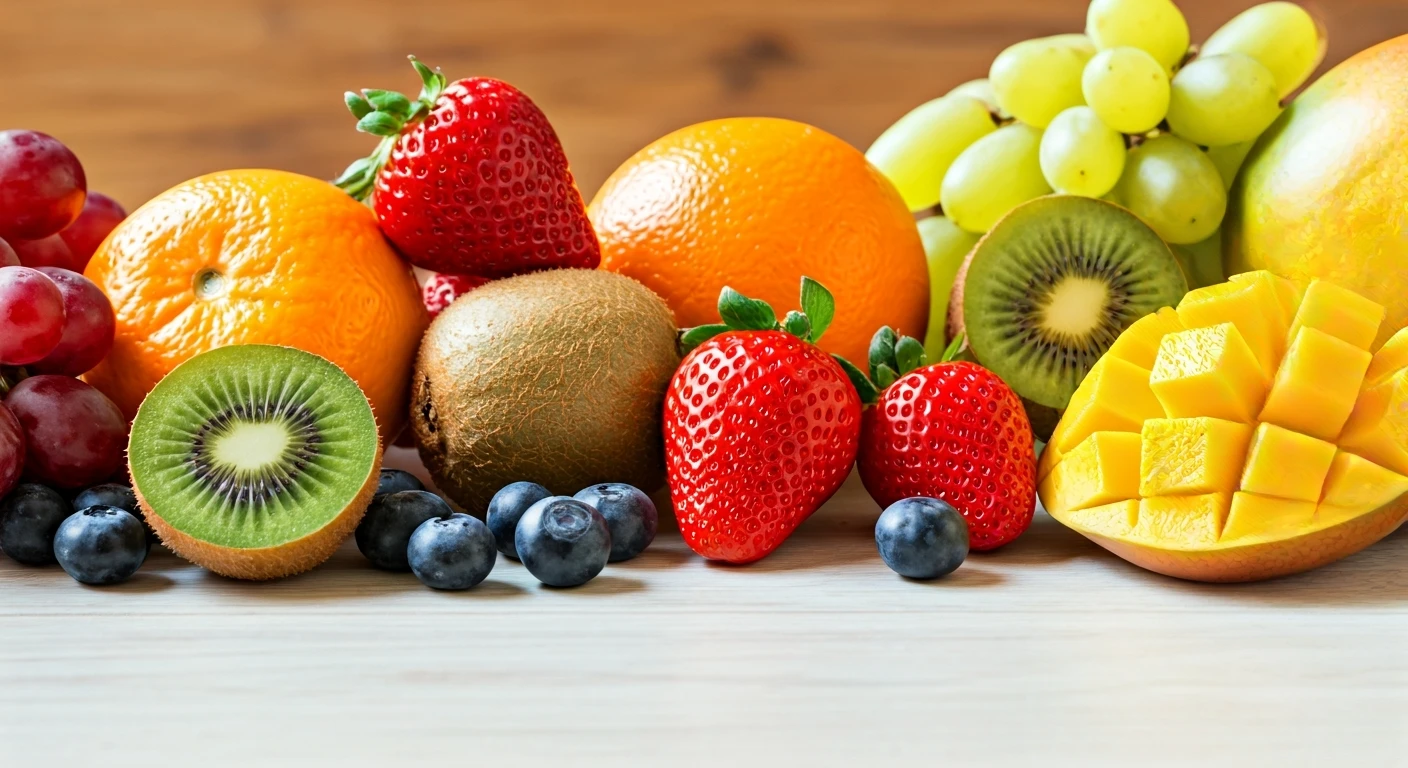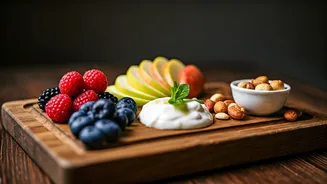Berry Bonanza: Blueberries
Blueberries are often lauded as a brain-boosting powerhouse, and for good reason! These tiny but mighty fruits are rich in antioxidants, which combat free
radicals that can damage brain cells. They are particularly high in anthocyanins, compounds that give blueberries their vibrant color and also protect the brain. Studies suggest that regularly consuming blueberries can enhance memory and improve cognitive function, making them a great snack for growing minds. These easy-to-eat fruits are a simple and delicious addition to any child’s diet, whether eaten fresh, added to yogurt, or blended into smoothies. The antioxidants in blueberries can play a crucial role in safeguarding the brain's health against age-related decline or other environmental stressors. Blueberries are not only delicious but also readily available, making them a fantastic and accessible choice for parents looking to support their children's brain health.
Apples: Brain-Boosting Bite
Apples are a classic, beloved fruit, and they offer more than just a sweet crunch. They contain quercetin, a powerful antioxidant that helps protect brain cells from damage. Apples are also a good source of fiber, which helps regulate blood sugar levels. Stabilized blood sugar is essential for maintaining optimal brain function, as the brain needs a steady supply of glucose for energy. The fiber in apples aids in providing this. Furthermore, apples are easy for children to eat and can be incorporated into various snacks, such as slices with peanut butter or added to a fruit salad. Apples also contribute to improved digestion. The combination of nutrients and ease of consumption makes apples a consistently beneficial choice. Regular consumption of apples helps ensure children receive essential brain-supporting nutrients in an enjoyable and convenient form.
Bananas: Energy Boosters
Bananas are more than just a quick energy source; they're also beneficial for brain health. Rich in potassium, bananas help improve blood flow to the brain, ensuring it receives a steady supply of oxygen and nutrients. They also contain vitamin B6, which is crucial for the production of neurotransmitters like serotonin and dopamine, which influence mood, focus, and cognitive function. The natural sugars in bananas provide quick energy, making them an excellent choice for kids needing a boost during school or play. Additionally, bananas are portable and easy to eat, making them a convenient snack for busy families. Including bananas in children’s diets contributes to sustained energy levels and supports the optimal functioning of their brains, making them a valuable fruit for overall cognitive development.
Oranges: Vitamin C Power
Oranges are synonymous with vitamin C, a potent antioxidant that shields the brain from damage caused by free radicals. Vitamin C also aids in the formation of collagen, which is important for overall brain structure. Oranges provide a steady supply of glucose to the brain. Beyond vitamin C, oranges contain flavonoids, which are known to improve blood flow to the brain and enhance cognitive function. The natural sugars found in oranges are beneficial and do not cause harmful spikes in blood sugar. Providing children with oranges helps bolster their immune systems and improves their ability to concentrate and learn. The refreshing and easily accessible nature of oranges makes them a wonderful addition to a child's daily diet, supporting cognitive health and boosting overall well-being.
Strawberries: Memory Support
Strawberries are not only delicious but also filled with antioxidants, particularly vitamin C, which plays a vital role in protecting the brain from damage. The antioxidants in strawberries help improve blood flow to the brain, which in turn enhances memory and cognitive function. Strawberries also contain flavonoids, which have been linked to improved learning and recall abilities. These bright red berries make a delicious and appealing snack for children. Including strawberries in their diet supports brain health by providing necessary nutrients for optimal cognitive performance. The enjoyable taste and ease of consumption make strawberries an excellent way to introduce more beneficial nutrients into children’s diets, enhancing their ability to learn and remember.
Grapes: Brain Protection
Grapes, particularly those with darker skins, are rich in antioxidants, including resveratrol, which is associated with improved blood flow to the brain. This can lead to better cognitive function and memory. These antioxidants help defend against age-related cognitive decline and other forms of damage. Grapes are also a convenient snack, easy to pack, and enjoyable for children of all ages. Furthermore, grapes offer a natural sweetness that satisfies the need for a treat, while still offering beneficial nutrients. Adding grapes to a child’s diet supports overall brain health by providing protection against environmental stressors. Regular consumption of grapes can contribute positively to a child's cognitive performance.
Kiwi: Vitamin K Benefits
Kiwi fruit is another powerhouse, packed with vitamin K and vitamin C. Vitamin K is essential for blood clotting and can also contribute to cognitive function. The vitamin C content in kiwis is beneficial for the brain, working similarly to that found in oranges and strawberries. Kiwis are also a good source of antioxidants, protecting the brain from oxidative stress. With their unique flavor and texture, kiwis can be a fun and beneficial addition to children's diets. Providing children with kiwis supplies them with a range of nutrients that help support brain health, cognitive function, and overall well-being. Kiwi is particularly beneficial in ensuring that growing children have adequate support for their developing brains.
Mangoes: Nutrient Boost
Mangoes provide a multitude of vitamins and minerals crucial for brain health. Rich in vitamins C and B6, mangoes support brain function and the production of neurotransmitters. They also contain antioxidants, which help protect the brain from damage. The fiber content in mangoes aids in maintaining stable blood sugar levels, critical for optimal brain function. Mangoes are naturally sweet and highly palatable, making them an excellent choice to incorporate into children's meals. These can also be used in smoothies or as part of a snack. Including mangoes in a child’s diet ensures the supply of vital nutrients necessary for supporting their brain’s optimal performance, including cognitive functions and overall development.
Pears: Healthy Blood Flow
Pears are rich in antioxidants, which aid in protecting brain cells from damage. They are also a good source of fiber, which helps regulate blood sugar levels, thus ensuring the brain receives a steady supply of energy. Additionally, pears contain vitamin K, which is beneficial for brain health. Pears offer a subtle sweetness and a pleasant texture, which makes them a great snack option for children. Adding pears to children’s meals helps contribute to their cognitive function. Their nutritious composition provides necessary elements for optimal cognitive performance and overall health. The mild taste and ease of consumption make pears a consistently good choice for incorporating brain-healthy elements into children’s daily nutrition.
Watermelon: Hydration & More
Watermelon is an excellent source of hydration, vital for brain health and function. It also contains lycopene, an antioxidant that helps protect brain cells from damage. Watermelon’s high water content supports optimal blood flow to the brain, which enhances cognitive performance. It is also packed with vitamins and minerals, helping to ensure the brain gets essential nutrients for function. This fruit is a favorite among children and can be used in numerous ways. Including watermelon in a child’s diet helps keep them hydrated and delivers essential nutrients that can help support the brain's overall function and cognitive well-being. Its refreshing taste and ease of consumption make watermelon an excellent way to introduce children to brain-boosting nutrition.













